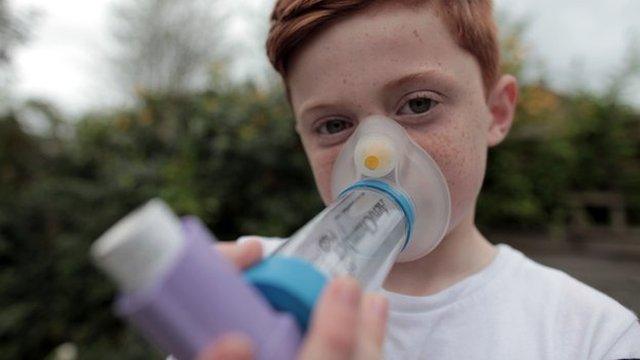Asthma and allergy devices 'not used properly'
- Published

Patients with asthma and severe allergies are often not taught how to use their medical devices properly, charities have warned.
Asthma UK said in some cases poor technique led to people being put on stronger inhalers than they actually needed.
And studies by Allergy UK suggest people struggle with instructions on auto-injectors in allergy emergencies.
The charities are calling for better training for patients and NHS staff.
The warning comes after a separate US study revealed only 16% of those prescribed adrenalin auto-injectors in case of a potentially life-threatening allergic reaction used them properly.
Common errors included not holding the device in place for at least 10 seconds and not pushing down forcefully enough with the needle to allow the adrenalin in.
In the same study, only 7% of asthma sufferers were found to use asthma inhalers in the right way, researchers reported in Annals of Allergy, Asthma and Immunology.
Training
Study leader Dr Rana Bonds from the University of Texas Medical Branch said the results suggested people weren't properly trained in using the devices in the first place or "forgot the instructions over time".

Adrenaline can help reduce swelling during severe allergic reactions and make it easier to breathe
Maureen Jenkins, clinical director of Allergy UK, said she was not at all surprised by the findings.
She said because there were different designs of inhalers and auto-injectors, people needed to get specific advice for the exact ones they had, which often did not happen.
"We have just finished a leaflet on allergic asthma which talks about proper use of these devices."
Yearly checks
She added that pharmacists were ideally placed to talk patients through using the devices when they picked them up from the chemist.
Dr Samantha Walker, director of research and policy at Asthma UK, said even though in theory everyone with an inhaler should have their technique checked annually, figures showed a third of people with asthma make mistakes with their inhalers.
And many of these mistakes are significant enough to reduce the effectiveness of their treatments.
"This is also hugely wasteful - asthma-prescribing is one of the most expensive areas of cost for the NHS, costing almost £1bn annually.
"You wouldn't give someone a new car without them having driving lessons first, so if you are going to invest in prescribing a lifetime of asthma medicines, it's crucial that healthcare professionals ensure that their patients know how to use them."
- Published30 January 2014
